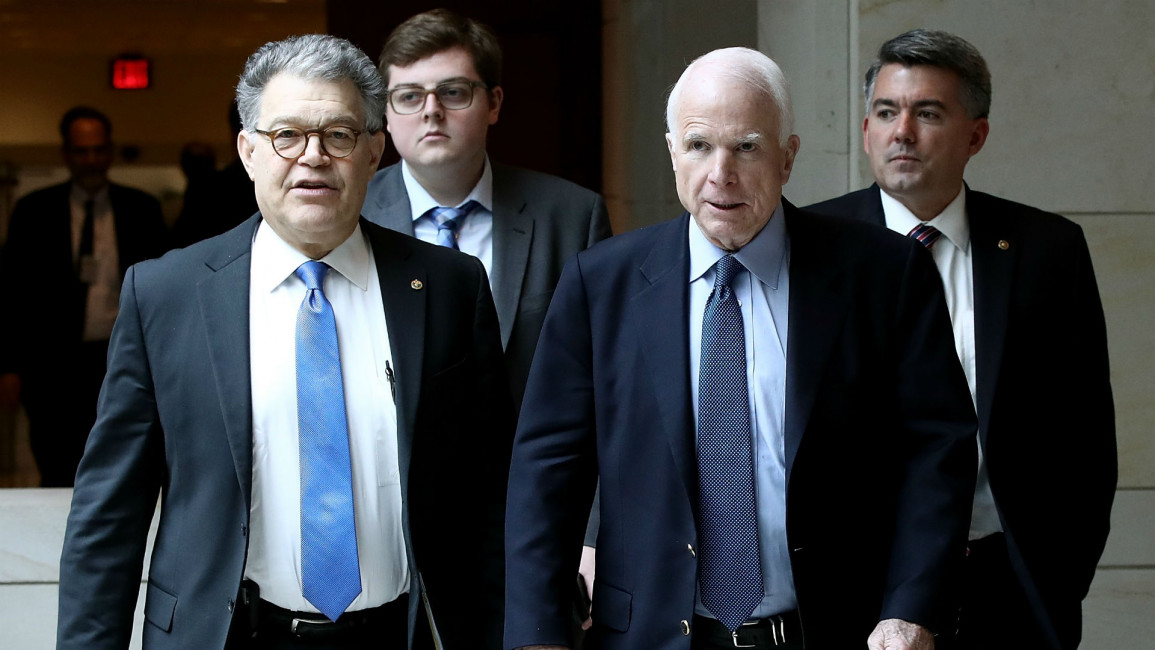Although many US lawmakers supported the Pentagon's air strikes on a Syrian airbase on Friday morning, there is increasing feeling among President Donald Trump's critics and backers that further military escalation will need permission from Congress.
The firing of 59 Tomahawk missiles at the Bashar al-Assad regime's Shayrat airbase rekindled the debate in Congress over the legal use of US military muscle.
Both Republican and Democratic senators emerged from a classified meeting on Friday backing the commander-in-chief's swift response to Syria over the chemical attack that killed over 80 people earlier this week.
The main points of contention, however, were what the president should do next and the legality of his first direct military action against the Syrian regime.
"It's critical under our system of government that these types of actions have congressional approval, because they are acts of war," House Republican Justin Amash told reporters.
"And what begins as a set of strikes on one night can quickly escalate into a much broader conflict."
What next?
Senate Foreign Relations Committee Chairman Bob Corker said the White House has yet to formulate a grand plan for deeper military involvement in Syria.
"If there's going to be a longer term engagement, no question" that a new authorisation of the use of military force (AUMF) would need to pass Congress, he said.
"But I don't think there's any sense of that (expanded engagement) occurring right now."
Senator John McCain, a military veteran who has proposed a harder line on Syria for years, said that such a strategy was in the works.
"We expect to hear that completed strategy very soon," he said, while emphasising the he did not believe that the White House was seeking a new AUMF.
Congress last declared war in 1942, when the US entered the Second World War. Since then, presidents have used their constitutional authority as commander-in-chief to unilaterally launch military oprations.
In a bid to check the president's powers, lawmakers passed the War Powers Resolution after the Vietnam War. The resolution necessitated congressional authorisation if hostilities lasted longer than 60 days.
Despite this, several presidents have side-stepped the law, including Bill Clinton in Kosovo in 1999.
Following 9/11, Congress passed an AUMF within days of the terror attacks, which gave President George W Bush sweeping powers to invade Afghanistan and pursue the perpetrators of the World Trade Centre attack.
Critics say that this emboldened US forces, opening the door to wars in Libya, Iraq, the mission to kill Osama bin Laden in Pakistan and the use of drones to kill terror suspects, including US citizen Anwar al-Awlaki.
Legality
Senator Angus King, a Democrat-leaning independent, has called for a new AUMF, saying that the current situation in Syria is far removed from the 2001 authority.
"This is different because this is an attack on a regime, not on ISIL (the Islamic State), and that really takes it even further out from under the 2001 AUMF," King told AFP.
A new AUMF was considered by lawmakers in 2013 when former president Barack Obama mulled military action against Assad. A vote on the authorisation was swept aside after Washington struck a deal with Moscow on removing Syria's chemical weapons.
Democratic Senator Tim Kaine emphasised that despite the clear need to hold Assad to account, "President Trump has launched a military strike against Syria without a vote of Congress."
He said lawmakers "will work with the president, but his failure to seek congressional approval is unlawful".
Senate Majority Leader Mitch McConnell, however, suggested that there was little urgency on the matter, as Congress' began its two-week Easter recess .
"If the president can think of some AUMF that he thinks will strengthen his hand, I will take a look at it," he told reporters Friday.


![President Pezeshkian has denounced Israel's attacks on Lebanon [Getty]](/sites/default/files/styles/image_684x385/public/2173482924.jpeg?h=a5f2f23a&itok=q3evVtko)



 Follow the Middle East's top stories in English at The New Arab on Google News
Follow the Middle East's top stories in English at The New Arab on Google News


